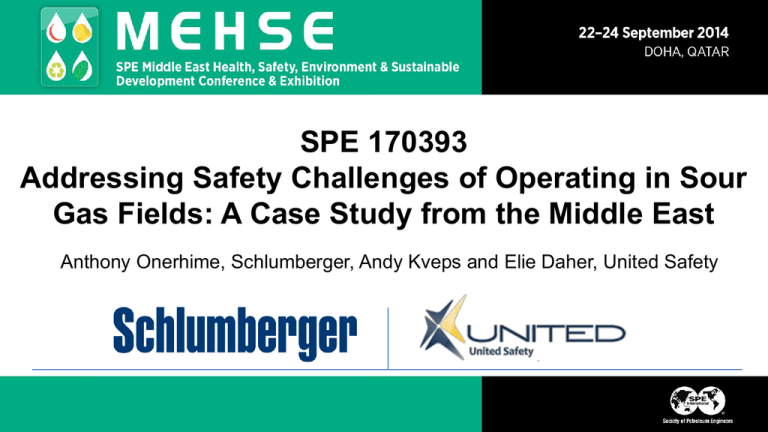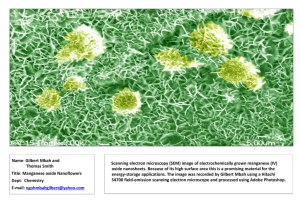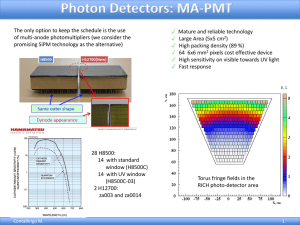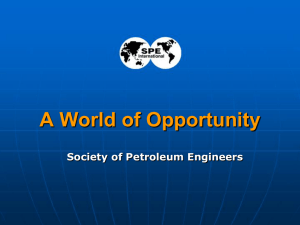- United Safety
advertisement

SPE 170393 Addressing Safety Challenges of Operating in Sour Gas Fields: A Case Study from the Middle East Anthony Onerhime, Schlumberger, Andy Kveps and Elie Daher, United Safety Slide 2 The Challenge of Sour Gas Hydrogen sulfide attacks the respiratory and central nervous systems of the victim, resulting in death at about 1000 ppm. Oil and gas projects in the Middle East can encounter H2S up to 400,000 ppm. Prevent exposure by implementing: • Mechanical and procedural measures • Early warning detection and notification systems • Breathing protection measures for personnel in the event of a release Slide 3 ANSI Z10-2012 Recommendation 1 2 3 4 • Anticipate, identify, and evaluate hazardous conditions and practices. • Develop hazard control designs, methods, procedures, and programs. • Implement, administer, and advise others on hazard controls and hazard control programs. • Measure, audit ,and evaluate the effectiveness of hazard controls and hazard control programs. SPE 170393 • Addressing Safety Challenges of Operating in Sour Gas Fields: A Case Study from the Middle East • Mike Gilbert & Anthony Onerhime Slide 4 Safety Gap SPE 170393 • Addressing Safety Challenges of Operating in Sour Gas Fields: A Case Study from the Middle East • Mike Gilbert & Anthony Onerhime Slide 5 Closing Gaps Through Innovation Marketplace Gap Seek expertise Innovate Apply SPE 170393 • Addressing Safety Challenges of Operating in Sour Gas Fields: A Case Study from the Middle East • Mike Gilbert & Anthony Onerhime Slide 6 Solution: Gas Detection and Alarm Gas detection and alarm system including dashboard panel Gas Detection System • Integrated internal and external toxic gas detection • External audio and visual alarm • Touch Screen Passenger Interface Onscreen vital information Display of gas levels and alarms Records of alarms and events Respiratory Evacuation Protection system SPE 170393 • Addressing Safety Challenges of Operating in Sour Gas Fields: A Case Study from the Middle East • Mike Gilbert Slide 7 Solution: Onboard Respiratory Protection System Photos Courtesy of United Safety Onboard Respiratory Protection System compliant with NIOSH air flow specifications. Gas Detection System • Air for five people for one hour • Compact lightweight footprint for minimal storage space • Rapid deployment air mask • Optional air line configuration Respiratory Evacuation Protection System SPE 170393 • Addressing Safety Challenges of Operating in Sour Gas Fields: A Case Study from the Middle East • Mike Gilbert Slide 8 Solution: Air Supply Module • Protects occupants while allowing visibility and mobility • Safe work procedure and training developed to ensure proper use • Continuous status of air supply and gas Gas Detection System Respiratory Evacuation SPE 170393 • Addressing Safety Challenges of Operating in Sour Gas Fields: Protection system A Case Study from the Middle East • Mike Gilbert Slide 9 Vehicle Gas Protection System Athira to insert Air Qruise pic from User Manual with label of features Gas Detection System Respiratory Protection System Evacuation Slide 10 Deployment • 20 VGPS deployed (in field or production) • Adapted to other environments • Prototypes prepared for innovative applications SPE 170393 • Addressing Safety Challenges of Operating in Sour Gas Fields: A Case Study from the Middle East • Mike Gilbert & Anthony Onerhime Slide 11 Conclusion Successful innovation and gap closure through collaboration Solution initially deployed in two-crew transportation vehicles in the field, with another 20 in production Increased worker confidence Field test-proven robust system for the unique challenges of the Middle East oilfield Investigating development in other areas of application. SPE 170393 • Addressing Safety Challenges of Operating in Sour Gas Fields: A Case Study from the Middle East • Mike Gilbert & Anthony Onerhime Slide 12 Works Cited Agency for Toxic Substances and Disease Registry (ADTSR). 2012. Hydrogen Sulfide (H2S) CAS 7783-0604; UN 1053. http://www.atsdr.cdc.gov/MHMI/mmg114.pdf (downloaded 5 July 2014). Alberta Energy Regulator (AER). 2014. Safety and Sour Gas. http://www.aer.ca/rules-and-regulations/by-topic/public-safety-and-sour-gas (downloaded 10 July 2014). American Petroleum Institute (API). 1995. Recommended Practice 55 for Oil and Gas Producing and Gas Processing Plant Operations Involving Hydrogen Sulfide. http://www.techstreet.com/products/25561#jumps (downloaded 28 May 2014). American Society of Safety Engineers (ASSE). 2012. ANSI/AIHA/ASSE Z10-2012 American National Standard for Occupational Health & Safety Management Systems. http://www.asse.org/shoponline/products/Z10_2012.php(downloaded 28 May 2014). Beauchamp R.O. Jr., Bus, J.S., Popp, J.A., Boreiko, C.J. and Andjelkovich, D.A. 1984. A critical review of the literature on hydrogen sulfide toxicity. Critical Reviews in Toxicology, 13:25–97. http://www.ncbi.nlm.nih.gov/pubmed/6378532 (downloaded 5 July 2014). Canadian Centre for Energy Information, 2004. Evolution of Canada’s Oil and Gas Industry. http://www.centreforenergy.com/documents/403.pdf (downloaded 5 July 2014). Engineering Resource. 2007. Sour gas—a history of expertise. http://engineering-resource.com/Files/sour-gas_2007.pdf_br (downloaded July 6, 2014). Guidotti, T.L. 1996. Hydrogen Sulphide. In Occup. Med. Vol. 46, No. 5. 367–371. http://occmed.oxfordjournals.org/content/46/5/367.full.pdf (downloaded 18 July 2014). Slide 13 Acknowledgements / Thank You / Questions Mike Gilbert Vice President, Middle East/ Asia United Safety International Quality & Innovative Safety Solutions P.O. Box 500582 Office Park Building, 3rd Floor Block A, Dubai Media City, UAE T: +971 4 369 5075 C: +971 55 898 0543 GilbertM@unitedsafety.net Anthony Onerhime UAE QHSE Manager Schlumberger Technical Services, Inc. Al Masood Tower, 16th Floor P.O.Box 21, Abu Dhabi United Arab Emirates Main Telephone: +971 2 633 3600 Main Fax: +971 2 634 9415 Direct: +971 2 610 1224 Mobile: +971 566 879 101 oonerhime@slb.com











